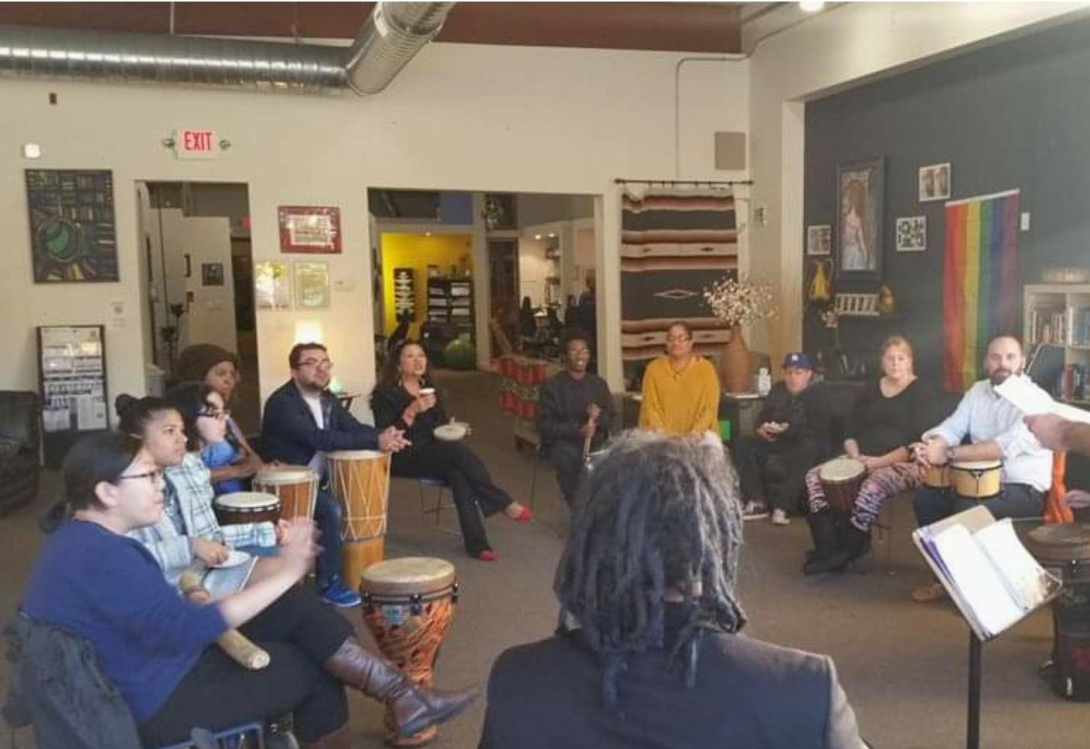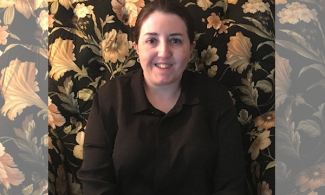
In 2007, The Transformation Center began to open resource centers known as Recovery Learning Communities with funding from the Massachusetts Department of Mental Health. These included the Central MA RLC, which is now called Kiva Centers and operates out of four main support centers. Today, Kiva Centers facilitates group meetings and other events in which people impacted by mental health and substance use issues receive mutual aid from others with similar experiences. This model, popularly known as peer support, developed out of the psychiatric survivor movement, which emerged in the 1970’s as a collaboration of individuals who had experienced abuse in the psychiatric system and believed in creating recovery-based alternatives for people who had received mental health diagnoses.
While more and more people are discovering how mutual aid initiatives around health and wellness can help them build autonomy in their lives, people who have received mental health diagnoses can especially benefit from gaining autonomy over decisions regarding their well-being. Kiva Centers, based in Central Massachusetts, works to promote this kind of self-determination through an approach of peer support and advocacy, as part of the psychiatric survivor movement. Peer support involves people with similar experiences, which in this case are experiences with the mental health system, sharing empathy and mutual aid in reciprocal, non-hierarchical relationships. While the concept is rooted in the radical, grassroots activism of the survivor movement, however, many believe it has been co-opted by the mental health system in ways that disempower peers. Kiva Centers communities, which are entirely peer-run, aim to provide true survivor-led support through groups for people “impacted by trauma, mental health diagnosis, and substance use experiences.”
“We consider our work survivor-led mutual aid,” says Vesper Moore, a peer specialist who works with young adults and trains other people for certification as peer specialists. At the same time, Kiva Centers uses language that is accessible to the public, such as “peer-run” and “peer support.” The centers formed out of communities that were started over 20 years ago by psychiatric survivors who believed recovery was possible for people who’d been given diagnoses as a result of emotional distress or trauma they’d experienced, an idea that ran counter to the biomedical model.
Vesper recalls when Kiva Centers, which started out as the Central Massachusetts Recovery Learning Community, was in its beginning stages. “Something that we noticed,” says Vesper, “was that the psychiatric survivor community was largely white, and was largely cis men, and our communities really weren’t.” Kiva Centers’ peer support groups, they explain, consist mostly of black and brown communities, and also include white people who identify as trans and/or queer. “We thought about the all-encompassing idea of trauma survivorship and system survivorship, and how that encompasses everyone.”
Being peer-run means that every member of Kiva Centers’ staff identifies as someone with lived experience of trauma and/or mental health diagnoses, which makes them uniquely able to support others with those experiences in their process of self-healing. One of the aspects that most differentiate peer support from psychiatry is that peer specialists share their own stories with those who seek support. In this crucial way, they are on equal footing, as people mutually exchanging understanding and support, unlike the relationship that exists between a psychiatrist or therapist and a “patient,” where the power dynamic is intrinsically uneven.
Kiva Centers encourages individuals to define their experiences in their own terms. Rather than assuming someone has a mental illness, peer specialists ask questions like whether someone has experienced a form of emotional distress, had any form of trauma, or if they’ve ever received a mental health diagnosis, and they reflect the language the person uses. “Reflective language is very important, because you don’t want anyone to feel ashamed of their experience,” says Vesper. Another vital aspect of their work is to not treat people as fragile, unknowing or lesser, something Vesper says both adults and young adults often experience in the psychiatric system. Vesper stresses that it’s crucial to “try not to infantilize people. Try not to treat them as if they are new to the world because of their experience.” Kiva Centers also operates under the principle of being trauma-informed, which means being informed as much as one can about other people’s experiences of emotional distress and trauma, particularly the inherent trauma that people of other social-class groups experience.
Receiving and getting treated for a mental health diagnosis, especially for those introduced into psychiatric care as children or teenagers, has been shown to produce the effect of learned helplessness. Individuals learn to distrust their own judgment and transfer responsibility for making decisions to their doctors, caretakers and other perceived authorities. As a result, they either lose or never properly develop the ability to cope with life’s challenges on their own, and resign themselves to lifelong dependence on psychiatry. Kiva Centers communities give people space to self-heal at their own pace and their own determination. An essential part of supporting people in building this autonomy is to ensure they have all the facts they need to make informed decisions for themselves about what their self-healing process will be. This includes providing access to webinars, articles and other resources about the impacts of traditional treatments such as medication. While many individuals within the communities choose to use alternatives to the biomedical model in their self-healing, however, they do not try to promote any particular viewpoint. “We’re never going to discourage or shame someone for what they’re doing,” Vesper says, “because that would take away from our entire mission.”
People who identify as psychiatric survivors tend not to identify with any mental health diagnoses they’ve received, but for many the term “psychiatric disability” feels closer to what they’ve experienced. “When we think about mental health diagnoses,” says Vesper, “we want to think more about social impacts, and how people identify with their experiences. ‘Mental illness’ is a presumptuous and traumatic way of thinking about that. There are people who identify with psychiatric disability, and with the fact that the psychiatric system is not accessible, and it’s disabling them for that reason.”
“Folks experiencing that emotional distress are not innately ill,” they say, “but they can identify with an aspect of the system being disabling as far as meeting their needs. They may be on medications that were a temporary solution and really aren’t beneficial to them in the long run, and may be physically affecting them, or they may be folks who feel they were misdiagnosed, or given a lot of different diagnoses, or folks who were put on a form of treatment that wasn’t the right fit.”
The psychiatric survivor movement, which emerged from the civil rights movement of the 1960’s and 70’s, was started by ex-patients of mental health services who’d experienced abuse in the psychiatric system and believed in creating alternatives that emphasized autonomy and empathy between people with similar experiences. Survivors used the term “peer” for individuals who participated in these initiatives, because it implied equality and mutuality. In recent years, however, the term has come to connote a workforce that exists within the confines of the system, usually under the supervision of clinicians. “I think the psychiatric survivor movement was co-opted and became peer support in the mental health system,” says Vesper.
Kiva Centers works under the ideology of trying to redefine peer support as something that has its roots in the survivor movement but operates as its own labor movement and as an in-system workforce. While the term “peer” has been co-opted in such a way that it no longer reflects Vesper’s personal experience, they say they still identify as a peer specialist and peer specialist trainer, because they believe in order to change something systemic, it’s necessary to have people working both outside and inside of it. “Peer support is a good means of in-system access—access to information, access to our people, being able to work mutually, and trying our best to humanize human services within the confines we operate in.”
“I say, if you’re in a peer support role, definitely push the envelope if you can,” they say, “but also consider the limitations that exist within our role, and inherently exist as long as systems exist.” These limitations, they believe, are why organizing outside of that system is key. “And we need to organize for our people, not for ourselves.” They feel that survivors are deprived of connection, and by finding connection with each other, they can create more change than by making peer support about their own work as an individual.
In training and working with peer specialists, Vesper says they like to support them in gaining a new perspective on “the pathologies of human experience, and the fact that we’re not inherently broken and fragile.” They also think it’s important to raise awareness of the psychiatric survivor movement’s history and radical origins, for people who might only be familiar with the more widely known version of it as a workforce. Out of this objective came the idea for the Psychiatric Survivor Webinar series.
“The Psychiatric Survivor Webinar series is an intention for folks who work in peer support to learn about the history of the psychiatric survivor movement, more in depth than it is often described,” says Vesper. Additionally, it provides an opportunity for survivors to network and share their ideas with each other. What started out as historical education, Vesper explains, has also become a way for people within Kiva Centers, and in other communities and organizations, to talk about psychiatric survivorship in different contexts. For example, they plan to hold a webinar to discuss Indigenous survivorship specifically. “We’ll be talking about how psychiatric survivorship and reclaiming the experience as a psychiatric survivor is a counter to some of the colonization aspects that exist in the Western medical model, and how that actually leads into the story of Indigenous people and Indigenous survivors.”
Even as Kiva Centers’ peer support groups are now conducted online to adapt to the safety risks of the COVID-19 pandemic, the concepts of peer support and mutual aid have become something most people can appreciate during this time of near-constant stress and isolation. Perhaps one of the most valuable things communities like Kiva Centers have to offer is the idea of not pathologizing extreme states of being such as anxiety and depression, but treating them as valid reactions to our environments. “Human beings innately experience trauma or emotional distress because they are alive,” says Vesper. “It’s important for us to reconnect to our humanity, and our interdependence and relation to one another. I think peer support really does that.”
Citations
Megan McGee (2020). From Surviving to Self-Healing. Grassroots Economic Organizing (GEO). https://geo.coop/articles/surviving-self-healing


Comments
Anonymous
August 22, 2020, 11:35 am
So many people are struggling and know they need assistance to help deal with the issues they are facing and yet are reluctant to cede too much control of that process to others. How reassuring and uplifting to know it doesn’t have to be that way.
Add new comment